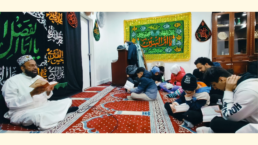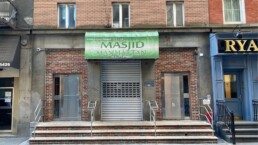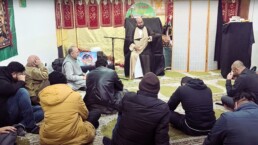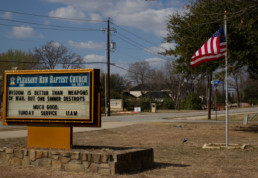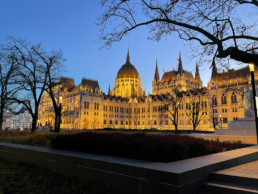A Sunday Children’s Quiz With a Twist, Ft. Imams, Namaz & Ethics
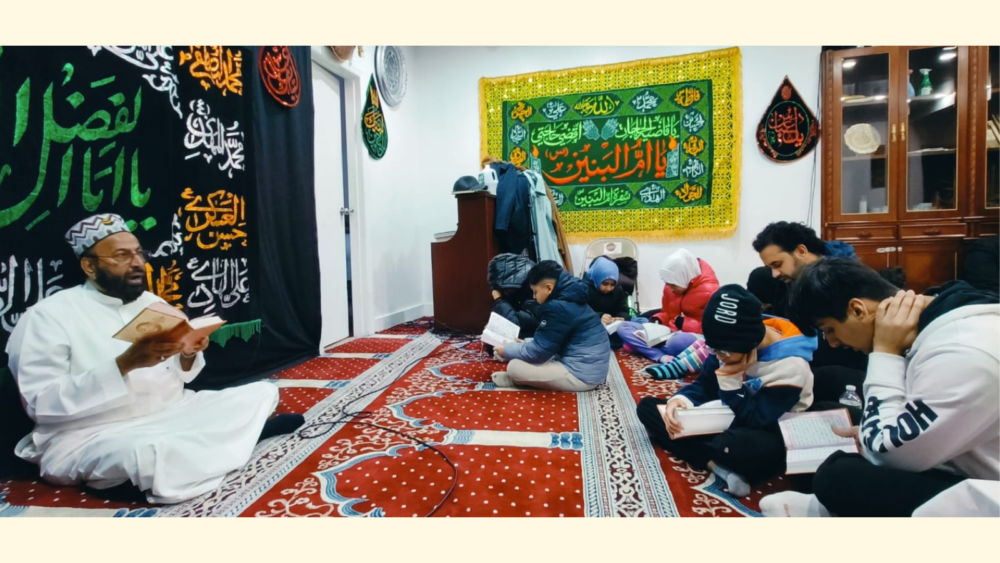
NEW YORK — A children’s quiz is on, in full swing. A dozen or so kids are seated on the floor in a semicircle in front of the quizmaster, answering his questions with aplomb. The rapid-fire questions, however, are not about current affairs or state capitals. Instead, they are about the names of revered imams and types of Muslim prayers.
It’s Sunday school at the Al-Mahdi Foundation mosque on Brooklyn’s Coney Island Avenue, and the children are being quizzed about their knowledge of Islam and Shia history.
They are asked to name the five pillars of Islam. “Who will count them for me?” enquires the quizmaster, Dr. Sakhawat Hussain, the founder of the Al-Mahdi Foundation. The children are eager to respond.
Nine-year-old Syed Mujtaba Haider says this is what he likes most about Sunday school at the masjid. She is particularly fond of the imam, whom she calls Maulana, meaning a learned Muslim scholar. “It’s fun, reading the Koran and answering Maulana’s questions. So, you can have more knowledge,” says the fourth-grader, rather knowledgeably.
Ameer Qaim Raza is a year older than Mujtaba. He’s come all the way from Staten Island. Why make the trip to Brooklyn every Sunday? “Because I get to see my friends and we get to read the Koran,” he says.
The quiz continues. “What is the meaning of roza?” “Fasting,” answer the kids. There are around nine boys, and three young hijab-clad girls.
“Which month is obligatory to fast?” The children respond immediately, “Ramadan.”
Can they name the five types of namaz or prayers Muslims are “obligated to perform everyday”? Yes, they can.
As the children continue answering his questions correctly, Hussain says, “You guys are getting expert, Mashallah (Allah has willed it). Your class is very successful today.”
“Can anyone name the 12 imams?” Unlike many of the other questions that would be applicable to all Muslims, this question is specific to the Shia fold, to which the maulana and his students belong.
“Imam Ali Alaihis Salam…Imam Hasan Alaihis Salam…Imam Hussain Alaihis Salam…,” the maulana and his students echo one another and go through the list of twelve. The “Alaihis Salam” said at the end of each name stands for “Peace be upon him,” an Islamic honorific used after naming holy figures.
They must know the names of the twelve imams, the maulana reminds his class. “Even if you are sleeping, and you woke up, and someone says, can you tell me the names of the twelve imams, (you should) say yes,” he tells them.
Interspersed in between the Q&A are lessons in ethics and morality from the quizmaster.
In the middle of his quiz, for example, Hussain says, “We are obligated to stop community members from committing sins – when someone is cheating, abusing, lying.” He adds, “But always be humble, be polite. Don’t get aggressive – Islam is peace, tolerance, forgiveness, love and harmony, politeness, this is Islam.”
Muhammad Danial Raza, a 15-year-old who had also come from Staten Island, said that hearing the line about Islam being a religion of peace and harmony made him happy. “It is, it’s true,” he tells me. “Islam is peace. It’s a good religion.”
Hussain cautions the children, “Do not become addicted to getting revenge.”
“I kind of get angry to people sometimes,” six-year-old Zamin Raza tells me.
“But Maulana said to be kind, right?” I ask him.
“Yes,” Zamin admits.
“I have a question - what is the meaning of ethics?” asks Hussain in class.
He answers the question he has posed, “When you get home, you say salaam to your parents, that is ethics. You will not shout. You will not bother. You won’t tease, you won’t back-bite, all this is ethics.”
Hussain adds, “Ethical values are more important than each and every thing.”
There are some more questions. A reminder to do the homework, and not to miss future classes. And then it’s a wrap.
The children leave. And adults come in and take their place. Sunday school is over, but the lessons shall continue. It’s time for the grown-ups now.
Fatiha: The Opening
NEW YORK — A man named Sayeed, one of the mosque’s leaders, directs dozens of worshipers to line up in three rows before the Friday jummah prayers begin at Masjid Manhattan. Some men arrive late and find themselves hastily removing their shoes in the hallway and finding some of the few empty spaces among the three rows of men.
The modest mosque on 30 Cliff Street in Manhattan’s financial district attracts Sunni worshipers of all ages and backgrounds. The room reflects the diversity of New York’s Muslims: Arab, South Asian, Black, Caucasian. Each stands side by side in anticipation for Jummah afternoon’s two Rak’at (a series of prescribed movements and prayers).
But before each Rak’ah, the worshipers must recite the Fatiha or "the opener." The Fatiha is the first surah (chapter) in the Quran. Abdullah Hossain, a recent PhD graduate in electrical engineering, recites the Fatiha in the front of the room.
In the name of God the most merciful
All praise is for God, lord of all the worlds
The most compassionate
The most merciful
Owner of the day of judgment
You alone we worship, you alone we ask for help
Guide us along the straight path
The path of those you have blessed, not those you are displeased with or those you have led astray.
As Hossain leads the prayer, each man focuses their attention on themselves, tucking their chins and keeping their gaze lowered to the space directly in front of them. They interlock their arms across their chest, preparing themselves for the Rak’ah. Every line of the Fatiha reminds them of their purpose as Muslims.
Sheikh Mostafa Shekel, the leader of the congregation, explains the importance of the Fatiha. “We recite the Fatiha before every prayer. It is the beginning of everything we do.” The prayer represents the core tenets of the Islamic faith: God is one, he has no equivalent, he displays compassion and mercy, and will determine the fate of each person on the day of judgment.
The sheikh explains that as Muslims, they must follow the straight path as described in the Fatiha. “In Christianity, Jesus forgives the people for their sins and they are redeemed,” he says. “Islam is not like that.” In Islam, he adds, each Muslim must follow the path of Allah and strive for excellence in the path to prepare for the ultimate day of judgment.
After Hossain finishes the Fatiha, each worshiper bends forward and puts their hands on their knees. They then place their knees on the ground, and bow towards the front of the room.
Each man then whispers from side to side:
Subhana Rabbi Al Ala
Glory be to my lord almighty.
They are now spiritually prepared to pursue the path of righteousness.
Why Songs of Zainab Moved This Shia Congregation in Brooklyn to Tears
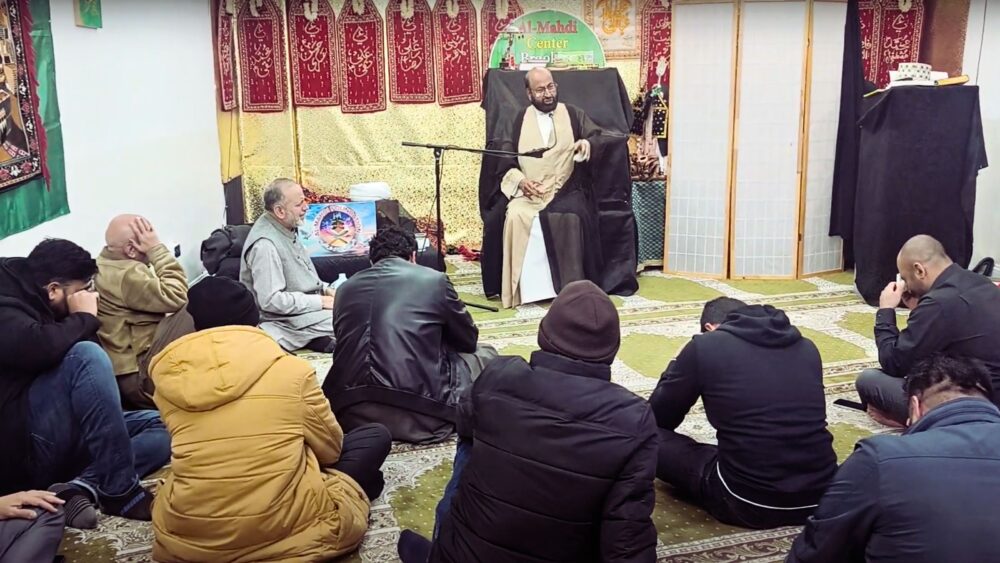
NEW YORK - A couple dozen grown men are seated on the floor, sobbing in unison.
It’s a rainy Sunday evening on Coney Island Avenue, in a Brooklyn neighborhood better known as Little Pakistan. A small crowd has gathered in the prayer hall of the Al-Mahdi Foundation’s masjid, a Shi’a mosque.
There are songs being sung, and poems recited. Each verse pays homage to Zainab bint Ali, the granddaughter of Prophet Muhammad.
The previous day, the 27th of January 2024, was also the 15th of Rajab 1445, as per the Hijri or Islamic calendar. It was the day that Zainab is said to have passed away, close to 14 centuries ago. The Shia congregation in Brooklyn is mourning Zainab by retelling stories of her suffering and bravery.
“Adab se kahiye, salaam Zainab (say it with respect, salutations to Zainab),” sings Rashid Zaidi, a worshiper at the mosque.
Prior to her death, Zainab had been taken captive by the forces of Yazid, the second chief of the Umayyad Caliphate. This was after the Battle of Karbala, in which Zainab’s brother Hussain and several of her relatives are said to have been killed by the forces of Yazid.
Zainab is remembered by the gathering for her resolve and resistance in the face of oppression. “Quran agar Hussain, tafsir hai Zainab (If Hussain is the Quran, then Zainab is its interpretation)", recites a worshiper.
Shi’a Muslims, who comprise a minority within Islam, are also a minority among the Muslim population in New York City. The majority of mosques in the city belong to the Sunnis. The holy day commemorating Zainab’s death, however, holds significance for Shi’a and not Sunni practitioners, and the Al-Mahdi masjid in Brooklyn is one of the few places in the city where such a commemorative event is being held.
As Zainab’s hardships in captivity are recounted, many of the members in the congregation cannot bear to look. They cup their faces in their hands in grief. An elderly man crinkles his tearful eyes and slaps his thighs. Next to him, 65-year-old Hasan Raza beats his chest lightly. He laments, “People slayed the Prophet’s family just for the lust of power. When we remember that, we cry.”
Syed Basit Naqvi, a 43-year-old cab driver, explains his outpouring of emotions during the commemoration, “Zainab’s captors had tried to humiliate her by walking her through the streets and snatching her hijab away from her. If I close my eyes, I feel like I'm looking at those things happening in front of me.” He adds, “You can feel it happening and you feel helpless.”
Channeling The Grief
“You relate to their grief, and the grief gives us a sense of belonging,” says Hussain Raza, a 36-year-old software developer from Pennsylvania, who attended the event in Brooklyn on Sunday. He adds, “Isn't that what everyone is looking for in the world - a sense of belonging?”
Raza continues, “When you listen, it goes in from one ear and then, I'm a software person so I'd say it goes into a loop, and then it goes to a different function in the body, your heart, your brain, and the emotion hits…and you tear up. It happens in milliseconds.”
Naqvi says, “The grief helps me - when you associate yourself with victims like them (Zainab and those alongside her), you tend to be more sympathetic with other people. The main purpose is so that you don't become the oppressors.”
He says it makes him want to help other people. “The grief softens your heart when somebody is in pain. Because when you're grieving people who have been killed like this, you cannot be cruel to anybody else.”
A young boy comes to remind Naqvi that they have to get going. It’s his nephew.
As Naqvi proceeds to leave the mosque, he remarks, “I don't feel angry on hearing the story. I feel that this thing happened in the past, but it shouldn't happen again. Never again.”
How the Synagogue Hostage Crisis Changed the DNA of Colleyville, Texas
As Congregation Beth Israel reopens, interfaith efforts deepen and houses of worship intensify security measures, adapting to “a more violent world.”
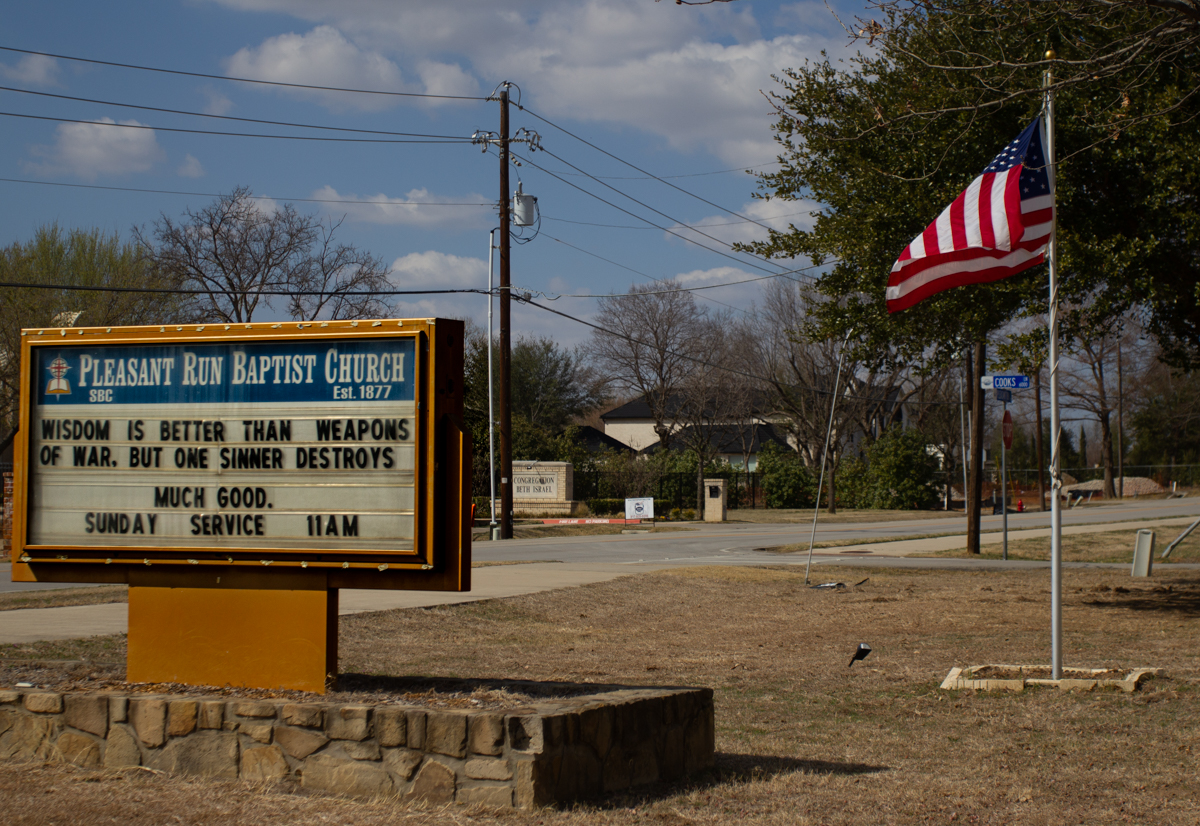
COLLEYVILLE, Texas – On Jan. 15, Colleyville, a small suburb just miles from the Dallas-Fort Worth Airport, was thrust into the national spotlight as a gunman, armed with a pistol, took four people hostage for 11 hours in the Congregation Beth Israel synagogue. All four hostages escaped unharmed before the suspect was shot, authorities said. The FBI labeled the incident as a terrorist act and hate crime.
But this acutely religious North Texas town with 28 houses of worship in its 13 square miles, did not retreat in fear and suspicion. Instead, it reconceived of the terror attack as a beacon of hope. Since the live-streamed standoff, religious leaders in Colleyville mobilized to ensure the safety of their believers and buttress the area’s robust interfaith system.
After nearly three months, the synagogue, which has been closed as a crime scene, is reopened to its 150 members on April 9. Since the incident, the congregation was hosted by the First United Methodist Church of Colleyville, one mile away. Now that it is back in its home, Congregation Beth Israel will have a police presence at every event. For Colleyville’s Jewish believers like Howard Rosenthal, former president of the Beth Israel Congregation, restarting services in the synagogue with reinstalled bulletproof windows feels like “moving forward.”
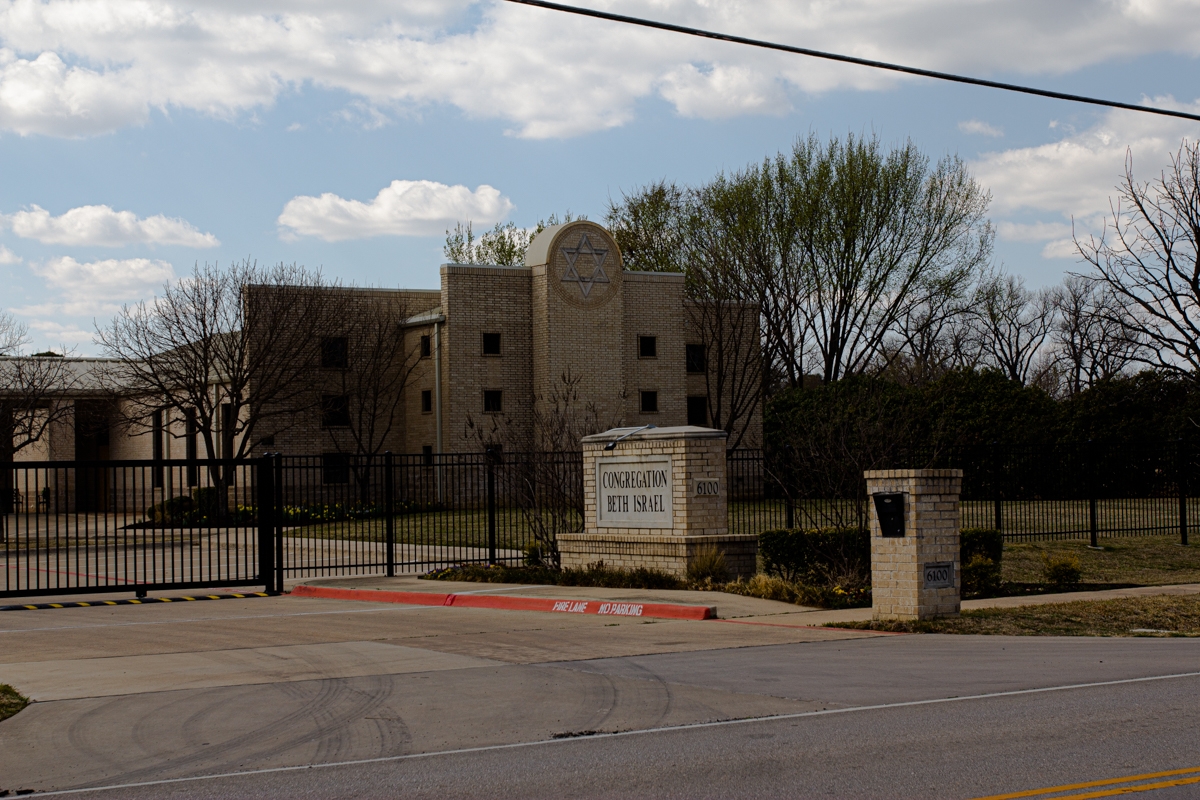
Interfaith activists in Colleyville, which is overwhelmingly comprised of Christians, said they want to set the record straight, referring to what they call the town’s mischaracterization in national press outlets. The scandals plaguing Dallas-Fort Worth have garnered media attention after the 2021 Capitol insurrection (which involved residents from DFW) and last year’s Critical Race Theory controversies at Colleyville public schools. Despite North Texas stereotypes, 21 religious community groups have been building interfaith bridges for four years under the umbrella of Peace Together, which was founded after racial and religious tensions unleashed at a 2017 “Unite the Right” rally in Charlottesville, N.C.
“We will have a safe, loving and committed community so we can go forward and not focus on the past,” said Rosenthal.
Having lived in DFW for 19 years, Rosenthal leads Peace Together and organized interfaith healing ceremonies after Jan. 15. Rosenthal was teary-eyed while recalling how interfaith leaders rushed in to help during and after the crisis.
As Rabbi Charlie Cytron-Walker of Congregation Beth Israel wrote in The New York Times:
“My congregation and I received an outpouring of love and support from strangers. If we begin with that love of the stranger, but offer it not in response to violence, but encouraged by empathy, we might just change our world.”
Everyone from Muslims to Catholics to Mormons stepped up. The Colleyville Texas Stake of The Church of Jesus Christ of Latter-day Saints, a member of Peace Together, has a deep respect for people who worship in different ways because Mormons have a history of persecution, said Leslie Horn, the Media Specialist at the church. Horn described Jan. 15 as a defining violation for her church. Still, the subsequent press coverage “missed a lot of the good,” she said.
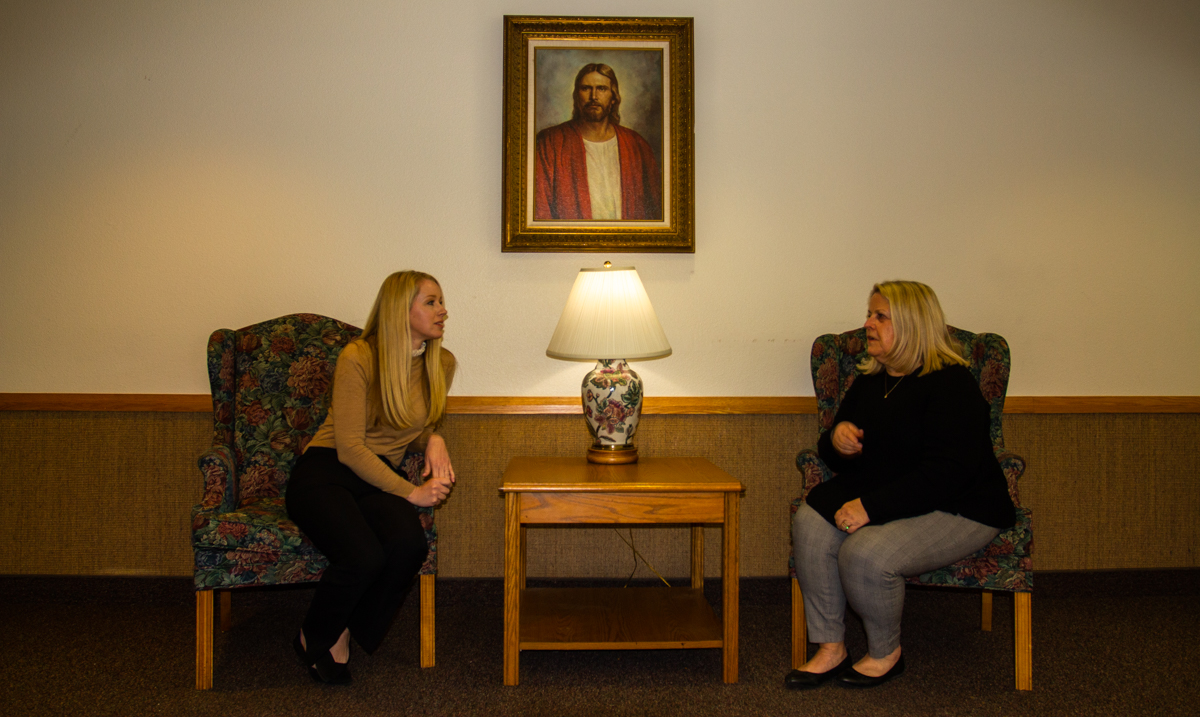
“In Texas, there tends to be this belief that we aren't diverse in thought, people and faiths,” Horn said. “But if you've spent any time living here, you quickly realize that’s not true. If you know anything about interfaith work, you know Colleyville is a leader.”
Horn said she could not fathom the juxtaposition of savagery in a sacred space. Horn, like so many religious observers in Colleyville, found herself in disbelief and kept asking herself, “Why Colleyville?”
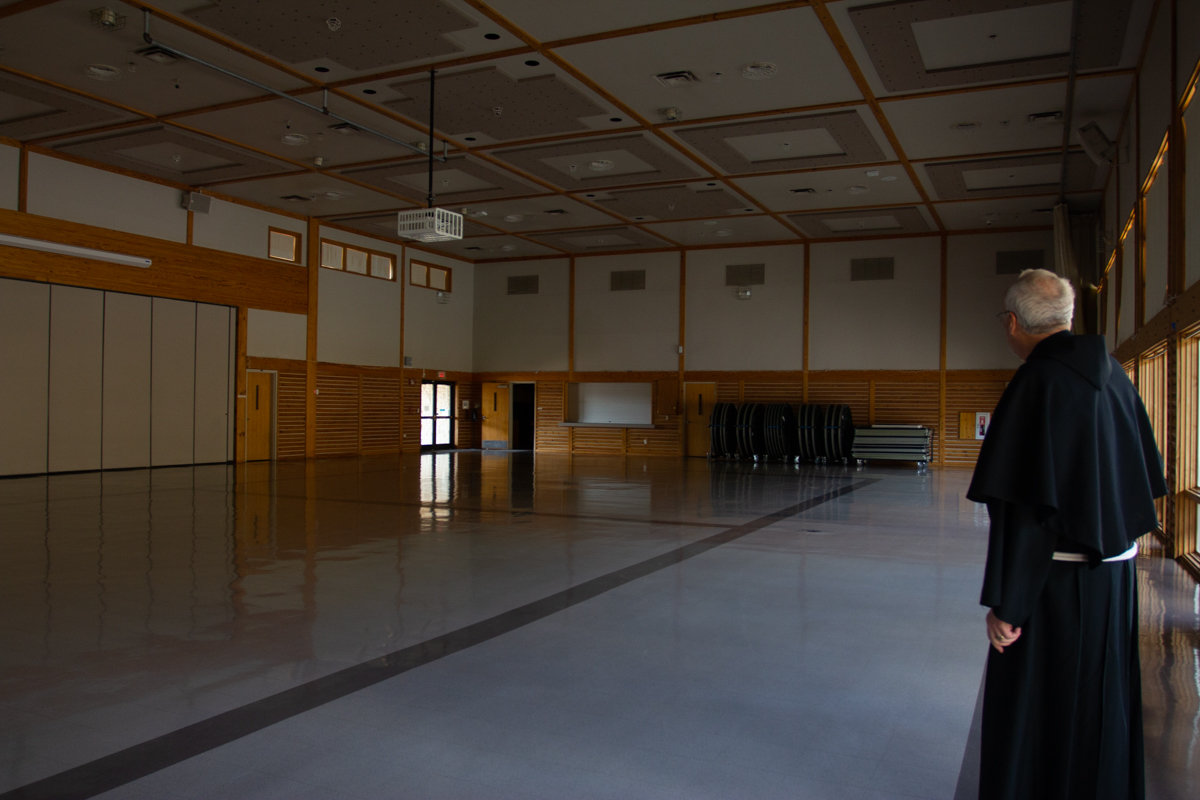
Rev. Michael Higgins, the senior priest at Good Shepherd Colleyville, shared Horn’s shock. Even though the standoff was “hectic and surreal,” Good Shepherd Colleyville jumped into action. For ten hours during the standoff, Higgins’ church, just one block away from the synagogue, hosted the press, the four spouses of the hostages and the local police. After the dust settled, Good Shepherd continues to seriously consider beefing up its security measures, said Higgins. Still, he refused to cancel Sunday services the next day, opting to pray for the town.
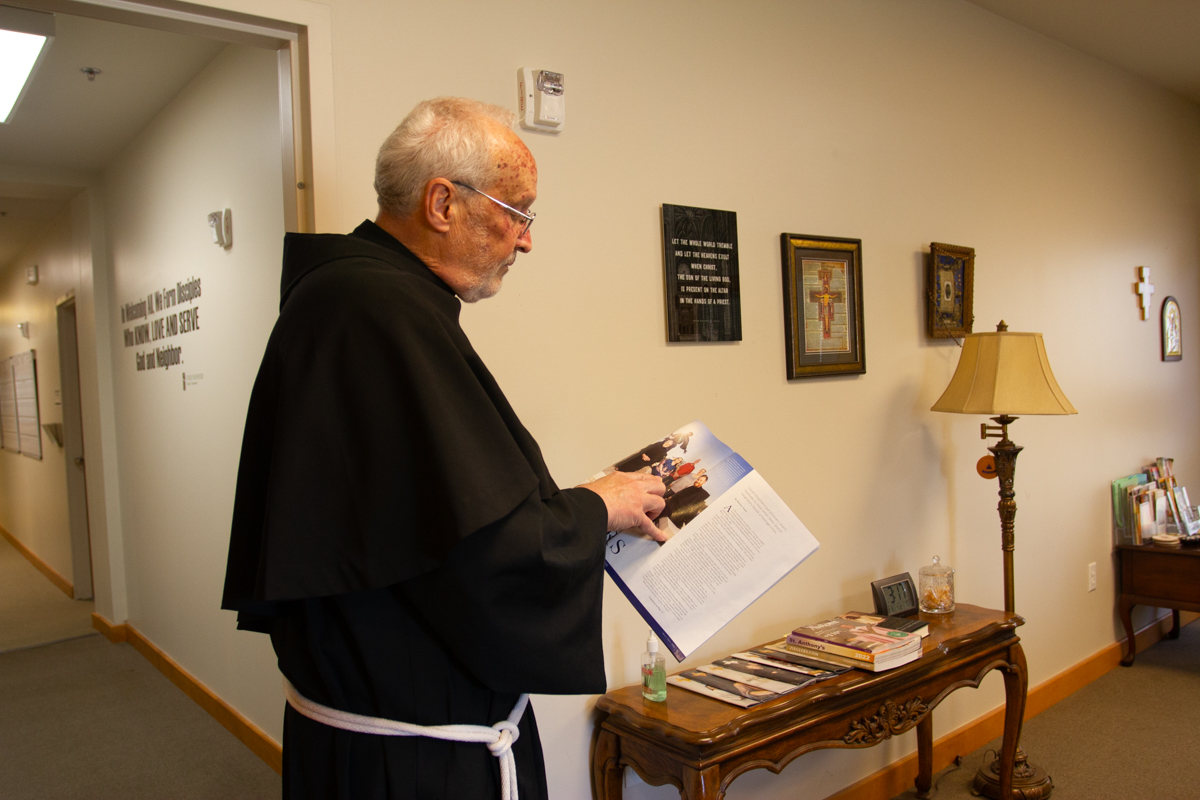
“Despite all the evidence to the contrary, God loves us,” Higgins said.
It is unfortunate that an event like this would be the catalyst for the country to be introduced to Colleyville. But January 15, Higgins said, was an immediate rallying of all faith traditions, which brought to light the reality of the tight community in Colleyville. Higgins has led the interfaith alliance in Colleyville since 2020.
“We were just trying to be of service,” Higgins said. “This shouldn't be special.”
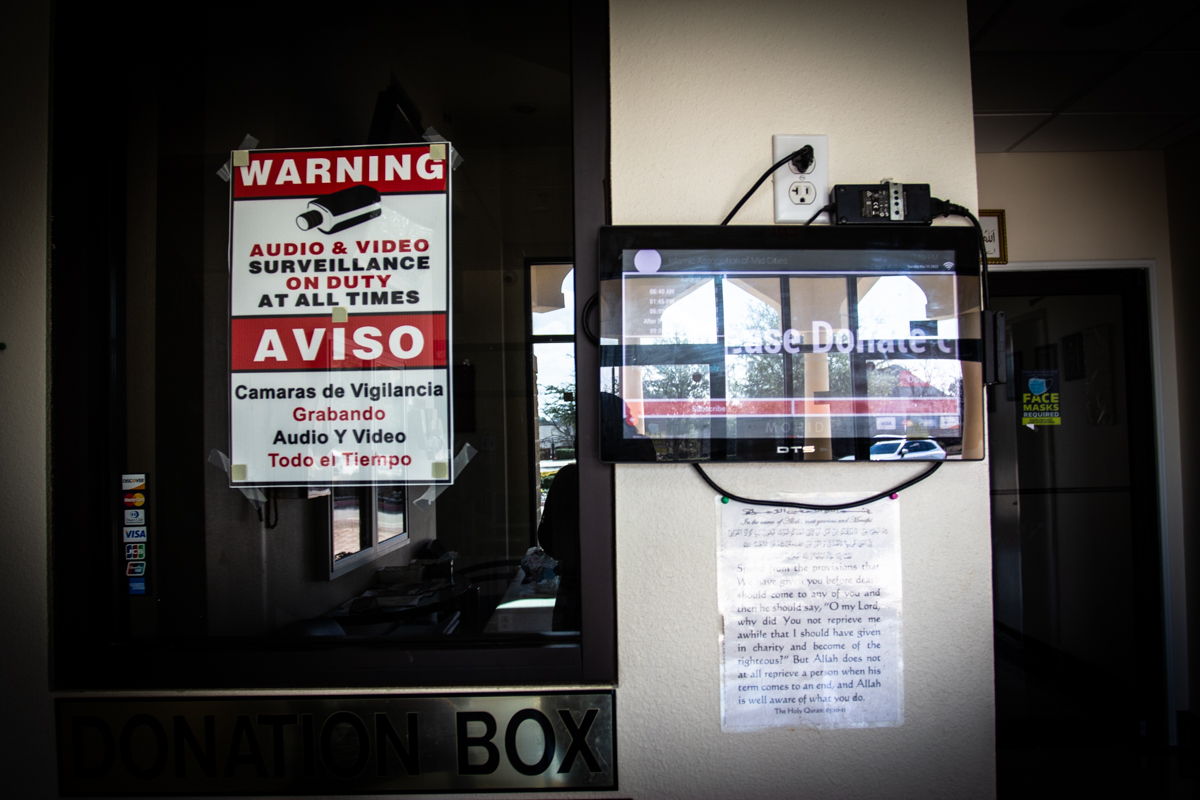
Abdul Rashid Khan, a founding member of Colleyville Masjid, said his house of worship is no stranger to the eerie sensation of looming danger. His gated mosque has had security since Sept. 11, 2001, and reactively increased its surveillance measures since Jan. 15. Khan, a friend to hostage Cytron-Walker and participant in interfaith meetings, said he could easily imagine a similar crime happening in his mosque. To cope and maintain hope, Khan has thrown himself into interfaith work.
“Our prophet Mohammed used to visit other religious spaces so that he could set an example of how his faith should be respected,” Khan said. “We follow that example.”
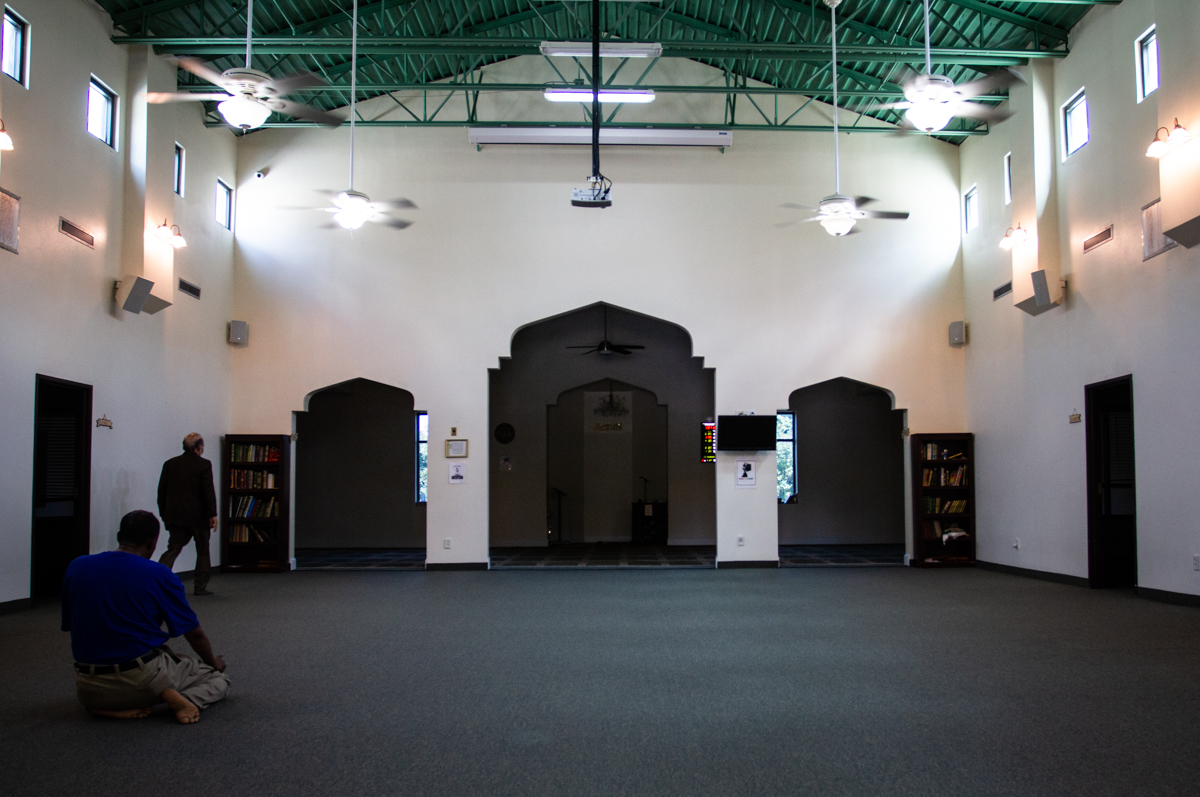
Katie Newkirk, a pastor at First United Methodist Church of Colleyville, reviewed her church’s safety policy after the “defining moment” of Jan. 15, installing new security systems and implementing training sessions for church staff. Still, she said Colleyville’s transformation in the past few months is twinged with optimism as local comradery has outshone religious differences.
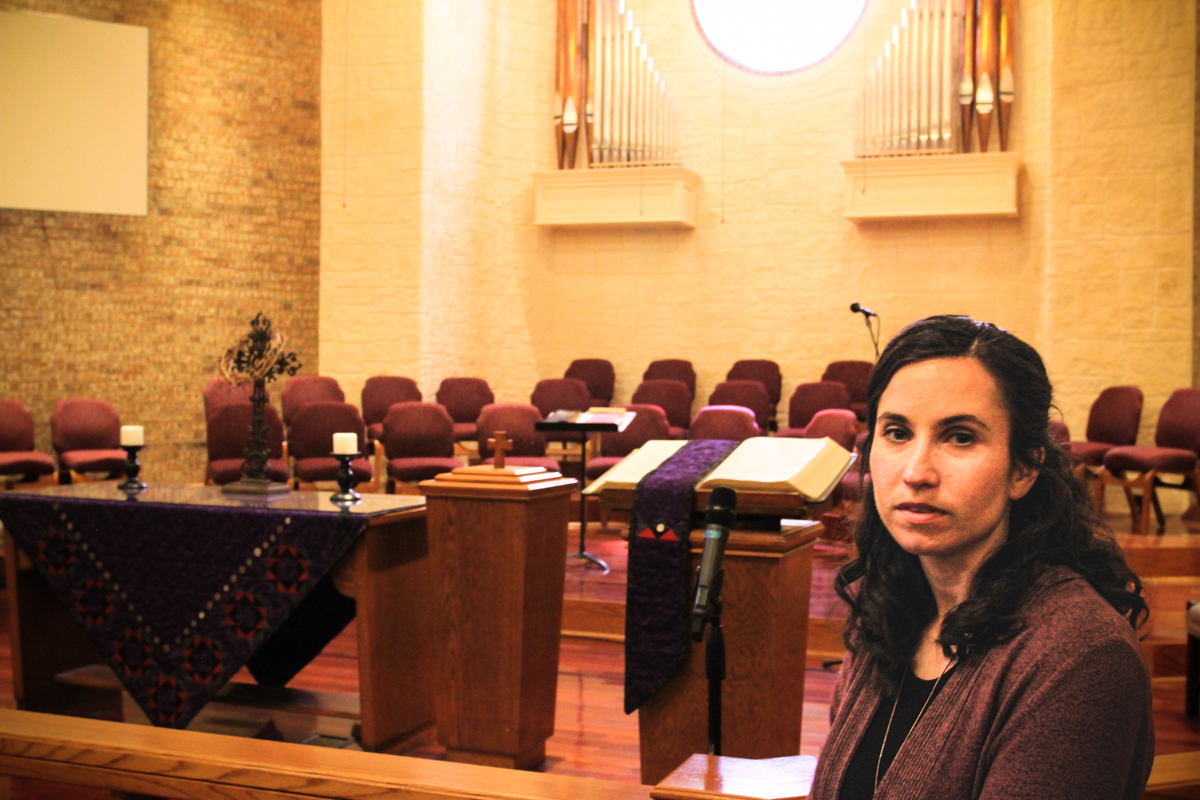
“It’s been a beautiful time to come together,” Newkirk said. “I don’t think God causes bad things to happen, but God brings good outcomes from messed up situations.”
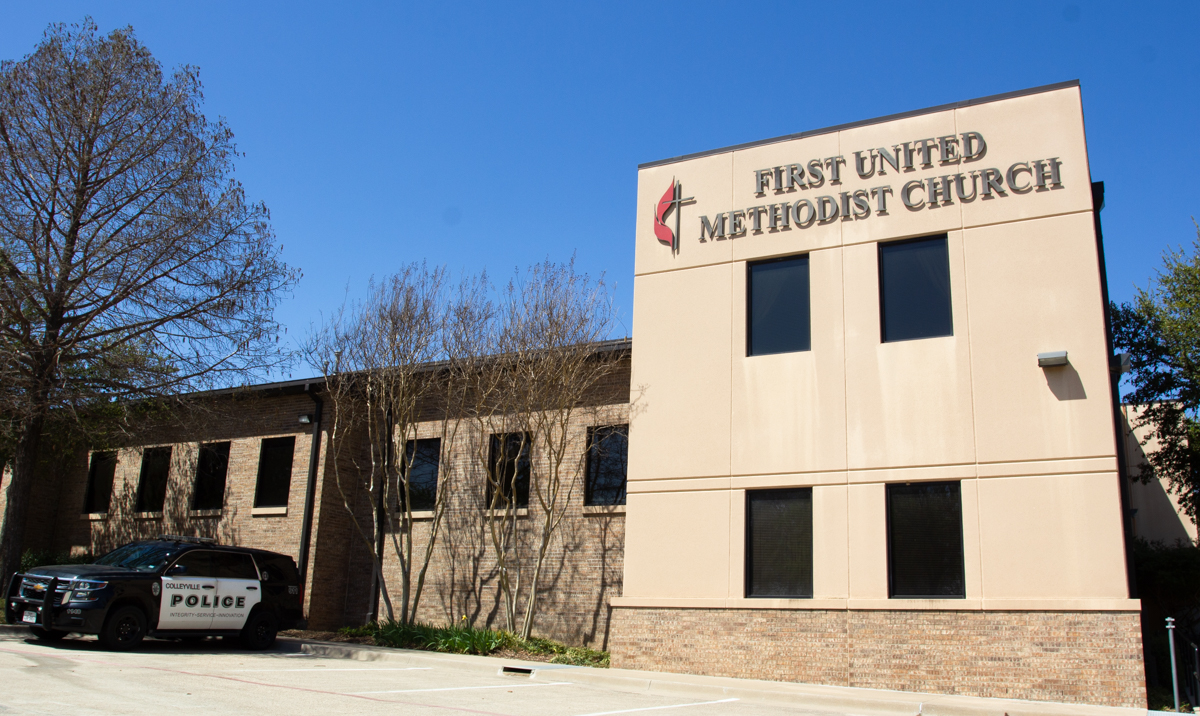
As Ukrainian Refugees Arrive, Hungary Remembers its History
BUDAPEST-- On a cold spring day, before the trees began to bud, Hungarian journalist Kinga Rajvak invites us into her apartment in the old Jewish Quarter of Budapest. The building stands tall, its bright green door contrasting the light gray of the early morning sky.
Right across from her wood dining room table sits a palm plant basking in the sun. It hides a discolored brick window frame. Rajvak said, “this dent right here was from a Russian bomb, during the 1954 uprising.”
The combination between past and present haunts Hungary. Talking about current events tends to lead into a comparison of a similar event from one of the country’s many dark chapters of its long history.
Hungary made headlines for its exclusionary and anti-Muslim refugee laws during the 2015 Syrian refugee crisis. Today, Ukrainian refugees receive very different treatment, though the laws remain the same. The common factor in these crises is Prime Minister Viktor Orbán.
On April 3, Orbán won his fourth consecutive term as prime minister, according to election results. Much of his party’s platform consists of anti-LGBTQ rhetoric and far-right ideals that are similar to legislation currently introduced and passed in Texas and Florida. Orbán describes his governing style as “illiberal democracy,” and is critical of Western values. He is an ally of Russian President Vladimir Putin, taking a pro-Russian stance on the war in Ukraine.
This relationship ratcheted up recent tensions in Budapest. Religious non-profits including Caritas, the Jewish Community Center (JCC) and the Jewish Joint Distribution Committee all helped refugees when Orbán’s government would not. As the April election drew nearer, the relief efforts were folded into a joint charity council that now has complete government oversight.
Many religious leaders involved in Ukrainian relief efforts are furious about Putin’s war and Orbán’s support for it. However, they must hold their tongue out of fear of government retaliation. They fear that they will lose whatever government backing that they get for the relief efforts.
The political split with the government, however, does not inhibit the work of the religious nonprofits, such as the JCC Budapest, according to the agency’s director, Marcel Kenesei. Instead, he said that the JCC focuses on its humanitarian efforts rather than on Orbán's agenda. Kenesei said the majority of the Ukrainian refugees that his agency has helped decided not to stay in Hungary long-term but instead emigrate to Israel.
“A lot of the people who live in Ukraine and belong to the Jewish community, and decide to leave the country, they are going to end up in Israel because a lot of the Jews have either Israeli citizenship or they are eligible to apply,” Kenesei said. “To get Israeli citizenship, that was an obvious choice for a lot of people.”
For Lyubov and her 4 year-old daughter, Daniel, who withheld their surnames for privacy, the ultimate goal is to get to Israel, she said sitting in the main room of the JCC, as her daughter drew in the seat next to her.
“So like all the people who came here, we need to spend some time here, then go to Israel because we are Jewish,” Lyubov said. “It takes somebody two weeks, maybe three weeks to make these documents.”
Lyubov and Daniel have no documents with them other than their passports. They fled Bucha just days before an alleged massacre was revealed to the world through drone footage obtained by the British government. Since Lyubov did not have documentation, they could only travel by train or bus. At first, she said she took Daniel to a border town in Poland. Once they arrived, she said she immediately left for Hungary because there were too many Ukrainians and not enough resources for her daughter and her. But, Budapest was never going to be a final destination for them.
“As far as I know, Viktor Orbán, the Prime Minister of Hungary, is more loyal to Russians than other prime ministers of other countries, and I don’t know which political view there will be in Hungary with him in power,” she said. “So, I would like to move to the place where we know for sure they defend us and want to stay on our side.”
Lyubov looked down at Daniel who was fussing with her red glasses and rubbing her eyes. As she was climbing into her mother’s lap, she gave Lyubov her stuffed rabbit to hold for her. Lyubov looked into the animal's black beaded eyes and said, “our bunny is with us.”

